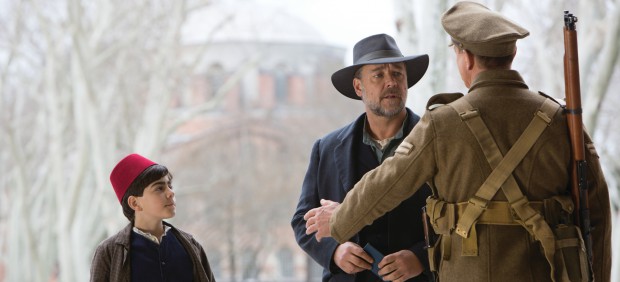
Directed by Russell Crowe
Starring Russell Crowe, Olga Kurylenko, Jai Courtney, Yilmaz Erdogan, Ryan Corr
Somewhat predictably, Russell Crowe’s directorial debut is a big, broad historical melodrama. Small scale meditations on the human condition are not for our Rusty – in The Water Diviner, Crowe uses nothing less than one of our most potent national myths as his clay, utilising the aftermath of the Gallipoli campaign as the backdrop to this story of loss and redemption.
In the aftermath of World War One, Joshua Connor (Russell Crowe) the titular water diviner, heads to the Gallipoli Peninsula the retrieve the bodies of his three sons, who were part of the invasion force. Once in Turkey, he has to contend with the Allied military, largely in the form of Lieutenant Colonel Hilton (Jai Courtney), who is in charge of the operation to recover the thousands of bodies still on the battlefield, and the rather more sympathetic Turkish war hero, Major Hassan (Yilmaz Erdogan). His quest becomes more urgent when he learns that one of his sons may have been captured rather than killed, and may still be alive somewhere in Turkey.
The Water Diviner takes a great concept and a fascinating setting – post-war Turkey was a hotbed of insurrection and unrest – and sadly uses them to chart the most obvious narrative course. It’s not a bad film, as it stands, and certainly contains some excellent scenes and some gorgeous visuals (the influence of Crowe’s frequent collaborator, Ridley Scott, is palpable), but it is exactly the film you picture when you think ‘Russell Crowe-helmed Aussie historical epic’: sentimental, unsophisticated, morally simple and unabashedly patriotic.
Opportunities to explore outside these straitened confines are largely squandered. Connor’s involvement with a young, widowed hotelier (Olga Kurylenko) and her son plays out in a fairly predictable, albeit engaging enough, manner, while the Greco-Turkish War, a conflict that has rarely if ever been dealt with in Western pop culture, is mere window dressing here.
Like its central character, the film is decent enough but taciturn, uncomplicated and emotionally inarticulate – and, if you’re feeling uncharitable, perhaps those qualities could be extended to the filmmaker. It seems that Crowe wanted to tell a deeply emotional story, yet shied away from grappling with the very emotions and themes inherent in his chosen text. There’s certainly a place for the ‘less is more’ school of filmmaking but, ironically enough, it requires a greater filmic vocabulary than Crowe possesses.
Still, there’s enjoyment to be gleaned here. Crowe the actor remains an effortlessly engaging screen presence, and there is something about The Water Diviner’s old fashioned sentiment that makes it hard to actively dislike. It’s by no stretch of the imagination the great piece of Australian cinema it’s so clearly striving to be, but it’ll make decently entertaining Sunday arvo viewing for generations to come.
TRAVIS JOHNSON